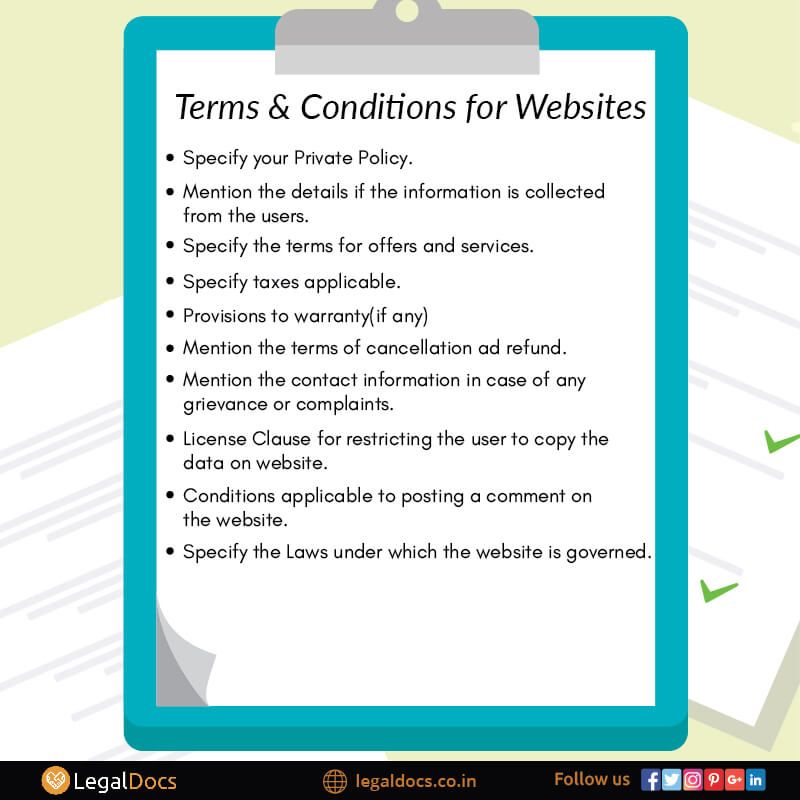Website Terms & Conditions - 3 Easy Step To Create
Login to our website and visit to the Form i.e. i.e. Website Terms & Conditions generator.
Fill in the details like website address, name of the organisation owning the website, type of the website and few other questions.
Our well-versed lawyers will work on drafting “Terms and Conditions for website” for you and the draft having all the required details will be ready for you to send.
You will get this document in an editable format so you can always edit the Notice as per your requirement.
Website Terms and Conditions (T&C)
You must be aware of the term “T&C apply” on various offers that you see every now and then on various advertising platforms. What it depicts is, under what conditions, provisions and terms of providing the service the provider is ready to serve you. The terms of service are communicated through a terms-of-service agreement which sets the legal relationships between the user and the service provider. It is vital to have this contract to place limitations on what can and can't be done with your content. It is not applicable only in case of a user of some product or service, it is also applicable to the users of any website.
T&C of a website is a legal document to protect a customer's or visitor's privacy. It depicts the ways in which the website and its owners gathers, uses, discloses, and manages a customer's or your visitor's data.
What exactly does Website Terms and Conditions mean?
All websites and internet service providers are like any physically existing service provider and every service provider must intimate its customers about the terms under which the service is being delivered. The terms of service are communicated through a terms-of-service agreement, here, terms and conditions agreement, which sets the legal relationships between the user and the service provider. This agreement is legally binding and subject to change without notice.
Need of T&C for Website:
The Terms and Conditions for Website or Terms and Conditions for e-commerce stores or Terms and Conditions for Mobile Apps set out issues like acceptable use, privacy, cookies, registration and passwords, intellectual property, links to other sites, termination and disclaimers of responsibility, etc. which are necessary to protect a website owner from liability of a user relying on the information or the goods provided from the site then suffering a loss. It also helps to protect your website and its users with clear and fair website terms and conditions.
Terms and Conditions Content
What shall be included in Terms and Conditions for Website?
Following shall be the content of the Terms & Conditions for Website:
1. Mention if you are collecting information from users and the way in which it is collected,
2. Specify if you have a separate Privacy Policy,
3. If you sell goods or services online or give some offer, specify the terms of such service,
4. Choice to opt out of e-mail service if any, and procedure for the same,
5. Specify Taxes applicable on purchase, if any,
6. The way in which the Intellectual Property of the Website is protected,
7. Specify the ways of use which would amount to illegal use of website,
8. The License Clause restricting the user to copy the data on website,
9. Specifications about blog, if any,
10. Conditions applicable on posting comment on website or interacting with other users,
11. Provision as to Warranties, if any,
12. Clause as to Copyright and Trademark,
13. Clause as to Jurisdiction,
14. Specify the Laws under which the website is governed,
15. Terms of Cancellation and Refund, if any,
16. And most essentially, Contact information in case of any grievance, complaint, etc.

Types of Websites:
There are different types of websites depending upon the particulars they deliver to its users. Depending upon their type, the requirements of T&C differs. Following are the different types of websites and the documents required by them:
Websites having Blog:
Blogs are used for the writing Articles and promoting the website and for Search Engine Optimization because content is the ‘King’ in Digital Marketing. Every blogger has to provide the disclaimer in the article so as to minimize the legal liability. If blogers hire Employees and Editors or Guest Authors, they are required make Editorial and Publication Policy like intellectual property rights or IPR of third parties, moderation guidelines etc. which is a very important part for a website having blog. Most of the Blogs also collect the data through the subscription widget as Email or other means for which they provide the T&C and/ or privacy policy for website. They also provide for ‘unsubscribe’ option in their mail when they send the promotion and other kind of emails.
Membership Websites:
Membership websites are generally used by e-commerce websites or a social networking websites or a subscription-based model where the website charges money per month or per year for providing valuable information or services. In such case website owners have to provide a privacy policy, a refund policy and Terms & Conditions for user agreements, rights of users, user obligations etc.
Affiliate Marketing or Advertising Website
Affiliate Marketing website generally used by Coupon websites or bloggers where they promote some product and provide links to that particular e-commerce website or any other website. That's why they are required to provide Affiliate Marketing Agreements Details, Payout Policy, Payment and Termination Terms etc.
Marketplace Website or Commission Based Website
Marketplace and Commission Website is generally used by a lot of the users in India. From the ‘On Demand Services’ to ‘Brokerage’ all websites run on these models, e.g. online cab booking websites, online hotel booking websites, e-commerce marketplace, etc. These type of websites have to provide their copyright, privacy, vendor agreements, refund policy, logistics agreements, third party data request & many more policies.
Terms and Conditions Law
Terms and Conditions for website in India is Governed by the Information Technology Act, 2000.
Who are required to maintain T&C for website as per Information Technology Act, 2000?
As per the provisions of Information Technology Act, 2000, all corporates, businesses and entities gathering, using, dealing with or handling sensitive personal data or information is required to maintain security practices and procedures designed to protect such information from unauthorised access, damage, use, modification, disclosure or impairment.
They are also required to provide the information called for by the competent Authorities and comply with all directions of the Information Technology Act, 2000, Information Technology Amendment Act, 2008 and the Information Technology Rules.
Which activities are considered as ‘Offence’ under the Information Technology Act, 2000:
The Information Technology Act enumerates various offences which are as follows:
1. Tampering with Computer Source Documents :
Knowingly or intentionally concealing, destroying or altering or intentionally or knowingly causing another to conceal, destroy or alter any computer source code, computer programme, computer system or computer network is called as Tampering with Computer Source Documents.
2. Hacking the Computer Systems :
Whoever with the intent to cause or knowing that he is likely to cause wrongful loss or damage to the public or any person, destroys or deletes or alters any information residing in a computer resource or diminishes its value or utility or affects it injuriously by any means, commits hacking.
3. Receiving Stolen Computer Data or Devices :
Any person who dishonestly receives or retains any stolen computer resources or communication device, knowing or having reason to believe the same to be stolen computer resource or communication device is perceived as Receiving Stolen Computer Data or Devices.
4. Publishing Obscene Information :
Whoever publishes or transmits or causes to be published in the electronic form, any material which is lascivious (something which excites lust in a person) or appeal to the prurient interest or if its effect is such as to tend to deprave and corrupt persons who are likely, having regard to all relevant circumstances, to read, see or hear the matter contained or embodied in it is supposed to commit an offence of publishing Obscene Information.
5. Sending Offensive or Publishing False Information :
Any person who by means of a computer or communication device engages in any of the following activities -
- Sending information that is grossly offensive or has menacing character;
- Sending information that he/she knows to be false, but for the purpose of causing annoyance, inconvenience, danger, obstruction, insult, injury, criminal intimidation, enmity, hatred or ill will, persistently;
- Sending email for the purpose of causing annoyance or inconvenience or to deceive or to mislead the addressee or recipient about the origin of such messages;
Is said to be Sending Offensive or Publishing False Information.
Penalties charged under Information Technology Act, 2000:
Various offences that are provided under Information Technology Act, 2000 are penalised as follows:
Tampering with Computer Source Documents is punishable with imprisonment up to three years or with fine which may extend up to two lakh rupees, or with both.
Hacking with Computer Systems is punishable with imprisonment of up to three years or with fine which may extend to lakh rupees, or with both.
Receiving Stolen Computer Data or Devices is punishable with imprisonment for a term of upto three years and/or with a fine which can extend upto one lakh rupees or with both.
Publishing Obscene Information is punishable on first conviction with imprisonment for a term which may extend to two years and with fine which may extend to two thousand rupees. In the event of a second or subsequent conviction, an imprisonment for a term which may extend to five years and a fine of two thousand rupees. (sec 292 of IPC)
Sending Offensive or Publishing False Information is punishable with imprisonment for a term of three years and with a fine as specified.
Current Account Opening
A current account is a type of deposit account that helps the professionals and businessmen to run their business. Businessmen can avail various benefits by Online Current Account such as:
- Unlimited transactions
- Customized features
- Online banking services
Online current account reduces the hassle and provides the benefit to complete the banking process anytime and anywhere.
Are you Ready to Grow your Business?
- Zero Balance Current Account
- In just 5 mins
- Free Current Account Powered by ICICI Bank
 Knowledge Center
Knowledge Center























